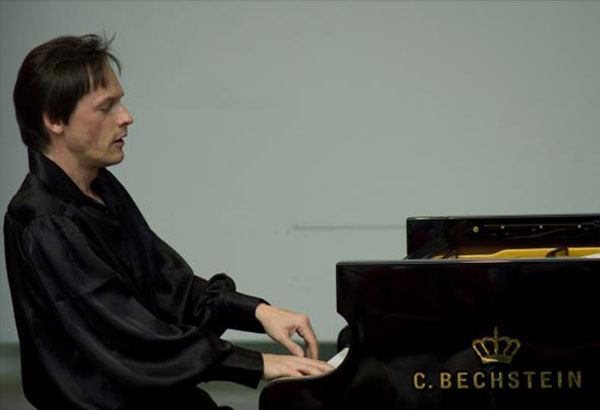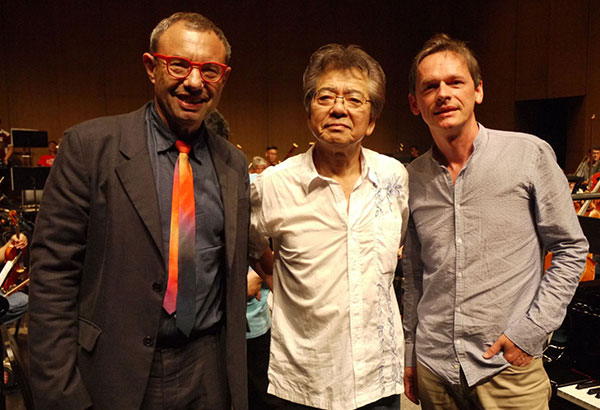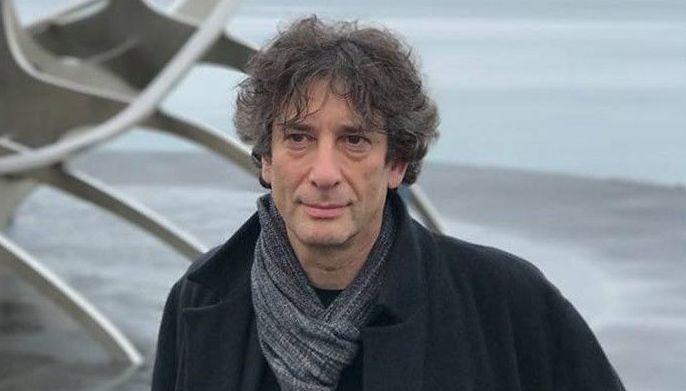Pianist Francois Chaplin unravels the appeal of French classics

French pianist Francois Chaplin plays Ravel’s Concerto en Sol and Chopin’s Nocturne Posthume en ut Dièse Mineur for the concert “Ravel Unraveled.”
MANILA, Philippines - Poetry is a personal expression,” says pianist Francois Chaplin, “much like the playing of a musical piece is a personal interpretation of a composition.”
Chaplin, a French pianist trained at the Paris Conservatory, has often been praised for the way he sculpts sound — rendering, for instance, Debussy’s sensual expression in the grit of an old Steinway. He has performed both as a soloist in Paris, London and Mexico, and with orchestras such as the Japan Philharmonic and the Saint Petersburg Philharmonic.
Last June 22 at the Cultural Center of the Philippines (CCP), Chaplin played with the Philippine Philharmonic Orchestra for the first time. In a concert entitled “Ravel Unraveled,” the pianist performed Maurice Ravel’s Concerto en Sol and Frederic Chopin’s Nocturne Posthume en ut Dièse Mineur.
The concert was held to commemorate the signing of the Treaty of Amity that took place 70 years ago, which formally established diplomatic relations between France and the Philippines. Presented by The French Embassy, the Stores Specialists Inc. (SSI) Group, and the CCP, “Ravel Unraveled” would benefit housing projects of the France-Philippines United Action (FPUA) Foundation, the first administered by the French Chamber of Commerce and Industry. Part of a yearlong celebration of Franco-Philippine friendship, the concert rendered classic compositions — as performed, interpreted, or sculpted by one of France’s most established pianists.
“I come from a family of painters,” says Chaplin. “While it did not influence my desire for music, it may have structured my imagination.” Surrounded by art and inspired by his mother who played the piano, Chaplin took up music lessons at the tender age of seven. He eventually entered the Paris Conservatory and trained under Wentsislav Yankoff, the Bulgarian pianist who led him to work on the Romantic classical repertoire.
It was, however, the French pianist Jean-Claude Pennetier who compelled him to focus on the strength of French music. “It is often referred to as Impressionist music,” he says of the style which focused not on rousing strong emotions, but simply the suggestion of a color or the conjuration of an atmosphere. “Particularly, Debussy’s compositions are influenced by Impressionist paintings,” he continues. “Many of them are inspired by nature and their colors.”

French Embassy counselor for cooperation and cultural affairs Yves Zoberman, Philippine Philharmonic Orchestra music director Yoshikazu Fukumura, and French pianist Francois Chaplin
Debussy — for whose centennial Chaplin will deliver a host of concerts in the coming year — was widely regarded as one of France’s greatest composers, his musical pieces a tour de force in Impressionism. Unlike Chopin who exercises his musical will in clearly calculated motions, drawing attention to the “percussion characteristic of the piano,” Debussy, says Chaplin, “wrote music to forget the sound of hammers hitting strings.” These were the two composers whose complete works he had recorded at the beginning of his career.
In “Ravel Unraveled,” the pianist traverses the musical territory of another proponent of Impressionism, Ravel — who, owing to the precision of his movements, was famously called “the Swiss Watchmaker” by the great Stravinsky.
“It’s a very chopped-up piece,” Chaplin says of Ravel’s Concerto en Sol, “very much like Mozart, that inspired Ravel in his composition. “ The concerto was one of the last pieces that Ravel had written before an accident. It included elements of jazz after his return from America, and the second movement, reminiscent of Mozart, was famously wrought bar by bar with painstaking precision. “The theme of the second movement of the concerto touches me deeply,” says Chaplin “Each note is where it should be.”
The role of the pianist, suggests Chaplin, is in equal parts paying respect and due reverence to the markings of the composers and also rendering the piece with his own poetic interpretation. To a degree, poetry is when nuances achieve the capacity to move you — in this occasion, to conjure color and image through the mechanical sculpting of sound.
“People have quite often recognized my playing through the sound and the feel,” says Chaplin, and in a time where musical instruments and recordings are often standardized, Chaplin favors playing on pianos that are “less than perfect,” he says, “where I am able to leave my musical imprint.”



















